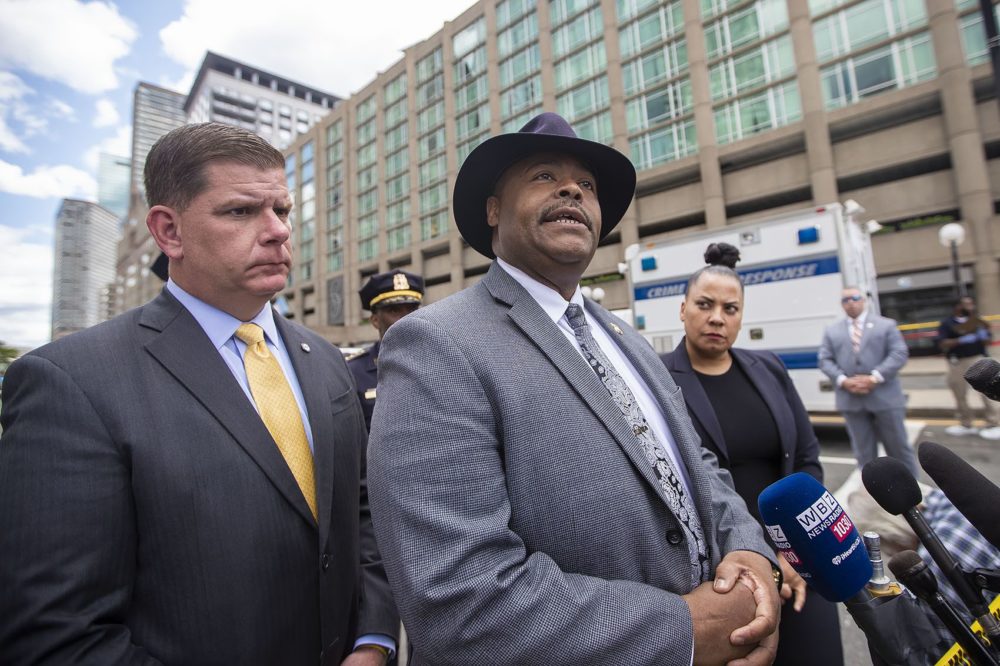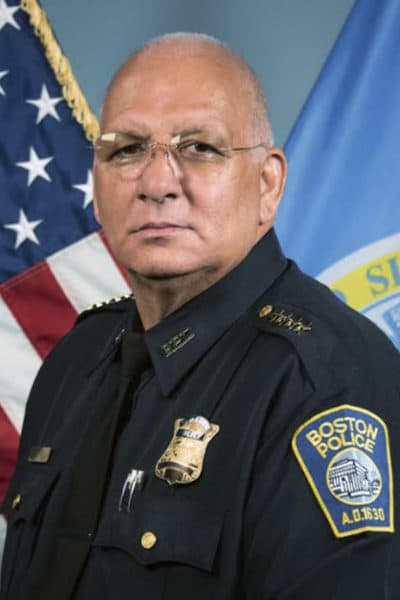Advertisement
Gross To Retire As Boston Police Commissioner, Mayor Taps Superintendent As Next Leader
Resume
Boston's first Black police commissioner, William Gross, is set to retire from the department Friday.
Boston police Superintendent Dennis White, who has served as Gross' chief of staff, will become the next commissioner. He will be the second Black man to hold the post, after Gross.
Gross was appointed commissioner in 2018 by Boston Mayor Marty Walsh. In a statement Thursday, Walsh thanked him for his 37 years of service to the department.
"Throughout his decorated career, he's always embodied the spirit of community policing that is so important to building trust with the people we serve," Walsh said. "Anyone who knows Willie can instantly feel his love for the job and his passion for keeping communities safe. No matter the situation, his warm smile, dedication, and love for meeting people made him uniquely capable of taking on the toughest challenges."
The abrupt resignation fueled some speculation that he may run for mayor to replace Walsh. But a Boston police spokesman said Gross has ruled out a run.

Neither Gross nor White were made available for comment. A city spokesperson said Walsh was not available for comment.
In a statement, Gross said it was an honor to serve as police commissioner and thanked the men and women of the department.
"They have shown time and again their unwavering commitment to our residents, rising to the occasion during moments of crisis, reaching out a helping hand to those in need, and running towards danger in the name of public safety for all," he said.
"My heart will always remain alongside my brothers and sisters of the BPD, who over the course of my 37-year career have become my village," he continued. "I will continue to be one of their biggest champions as I move forward with my next chapter."
White, who has been with the department for 32 years, will be acting commissioner until he is formally sworn in. He was a member of Walsh's police reform task force, which made a host of recommendations this fall, including the creation of a new oversight board over the department.
"To the community and all the members of the Boston Police Department, I pledge to uphold our mission of community policing each and every day," White said in a statement. "Serving as commissioner is the honor of a lifetime, and I will never take this sacred duty for granted."
Officer Larry Calderone, president of the Boston Police Patrolmen's Association, noted that both Gross and White rose through the ranks as working police officers. Calderone called Gross "a complete gentleman and a professional who was a pleasure to work with through these troubling times."
"As for Superintendent White, I’ve known him my whole career as well. He also rose through the ranks and knows the needs of the department and its rank and file officers," he said in an email. "We look forward to continuing our strong working relationship with him, now that he is the new police commissioner."
Suffolk County District Attorney Rachael Rollins, who traded written barbs with the police union after Floyd's killing, said Gross has been a "valued partner in our shared desire to make residents in the City of Boston safe from violence and harm."
"We have stood shoulder to shoulder at homicides and other violent crime scenes, working together to restore and build on the trust and faith in law enforcement that our communities need to have," she said in a statement. "I look forward to continuing that critically important work with Acting-Commissioner Dennis White.’’
Wayne Budd, the former U.S. attorney for Massachusetts and associate attorney general who chaired the police reform task force, said Thursday he was surprised by Gross' sudden retirement. Budd said Gross was fully cooperative and supportive of the task force's work.
"He has been the Boston police commissioner during a very difficult time, not only in our city, but throughout the country," Budd told WBUR. "He was a steadying force. I thought he did a terrific job under very difficult circumstances."
Since May, Gross has overseen a department under even more scrutiny, after the police killing of George Floyd in Minneapolis reignited calls for police accountability and racial justice.
Gross called Floyd's death "a DAMNED shame" on Twitter, and said if there were any incidents like that in Boston, they would be handled.
"That is not indicative of all law enforcement but those of you who think it is, we have to prove that it isn't that way," he said at a press conference that week.
Just days later, after a protest in Boston that ended at the State House, hundreds of Boston police officers clad in riot gear clashed with protesters. More than 50 people were arrested, several officers were injured and a police cruiser was set on fire. Police blamed protesters looking to cause destruction, while others said police escalated tensions when they tried to push people out of the area minutes after the protest ended.
Gross' statements and actions have aroused controversy. Months after being sworn in, in a Facebook post he criticized the ACLU — which was suing the department for access to its gang database — calling the civil rights organization "paper warriors" who didn't support police or care about crime.
Last June, Gross met with and was photographed with then-Attorney General Bill Barr. It drew strong rebuke from local leaders, including Walsh, who tweeted that "Barr and the Trump Administration do not share Boston’s values or my values."
And in May he — without evidence — blamed rising crime on "liberal judges" who were releasing people during the coronavirus pandemic.
But Gross also publicly bought into the calls for police reform, led by his boss, Walsh. He adopted the "8 Can't Wait" reforms, which are designed to reduce the use of force by police. He oversaw the rollout of a permanent body camera program. He supported the work of the police reform task force.
Jamarhl Crawford, a community activist from Roxbury who also served on the police reform task force, told WBUR the next commissioner will have to heal the rift between communities of color and the department. Not just for what's happened in the last few years, he said, but for decades of distrust.
"Clean and clear the slate," he advised. "There was a lot of dirt done, not under your watch, and now it just would behoove you, to clean the slate, get rid of the bad blood and put a good foot forward for the community, the city at large, to just say, listen, we're trying to start anew."
Crawford said he was excited to see White tapped for the post, calling him thoughtful and someone who can listen even when there are difficult conversations.
White was one of just two police officers on the reform task force. Budd called him an "invaluable resource" who helped craft the panel's final recommendations, which are set to be implemented over the next few months.
"I think that he will do all within his power as commissioner to see that they are implemented to the fullest extent possible," Budd said.
Walsh called White a "proven leader," who will implement the task force recommendations.
Tanisha Sullivan, a police reform task force member and president of the Boston NAACP, said Gross was challenged during his time as commissioner — in part because he was the first Black person to hold the position.
"His mere presence in that seat automatically put him in a position where he had to balance not only being effective in his job as commissioner, but also debunking some racist thoughts about the capacity, the capability of a Black person to sit in that seat," she said. "So he had to bear, in many respects, that cross as do many firsts.”
With White’s appointment, Sullivan said, Gross won’t be the last.
WBUR's Shannnon Dooling contributed to this report.
This article was originally published on January 28, 2021.
This segment aired on January 28, 2021.
